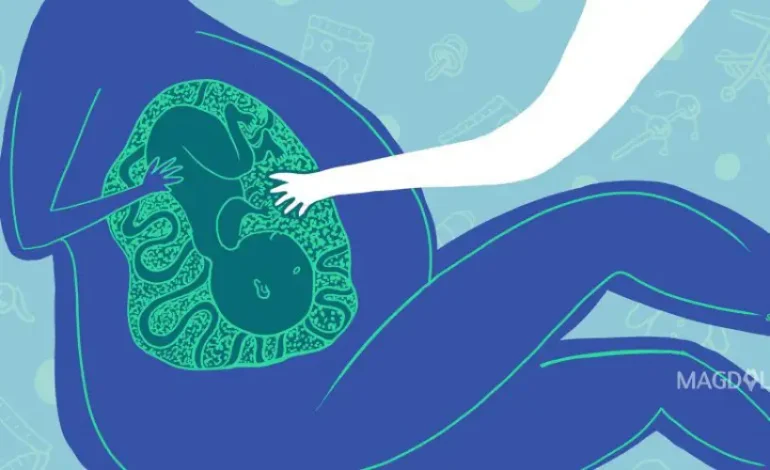How COVID-19 Has Changed The Way We Give Birth

COVID-19 has changed how we live, including how we give birth, where we give birth, and who is present when we give birth. Scientists are still conducting research on the effect of these changes, and while the experience of childbearing has become more difficult in many ways during the pandemic, there may also be some benefits in the long term.
Childbirth is a time when women can feel particularly vulnerable. But they can find comfort in having capable and reassuring figures to provide them with support and motivation, and never more so than when labour takes a long time or is more complicated than usual.
Midwives play a key role in this, but often their workload is such that they cannot always offer the level of one-to-one personal contact an expectant woman may require. Throughout the coronavirus crisis, midwives have been under increased pressure, dealing with chronic levels of understaffing exacerbated by rates of sickness or enforced isolation. Many are exhausted and have low morale, but they work as hard as ever to ensure a birth is the positive experience it should be for parents.
Birth is naturally a shared experience, but restrictions arising from the crisis have left many women unable to have anyone other than the midwife present until the final stages. For some, it feels that we are going back to the days when fathers were not permitted in the birthing room until everything was over.
As a result, some women have been left feeling that they have been forced to go it alone, with birth partners who risk missing out on all or most of the experience also feeling guilt and anger at the thought of not being there to support their loved one at such a time. Partners might also worry that not being present at and after the birth could affect their bond with their new born infant.
The opportunity to learn the skills of baby care and infant feeding together in the first few days also risks being lost, leaving women being sent home to fend for themselves initially. Limits on visitors can also increase feelings of isolation.
Worse still, if the birth doesn’t go as planned, a woman may end up grieving separately from her family. While midwives fill the void as best they can, and as valuable as the crucial care they provide is, their presence can’t make up for the absence of family and friends at these key moments.
Also read: The Time I Didn’t Cry: My Baby Blues Story
There is recognition of these issues within the health service and guidance published at the end of 2020 sets out the steps hospitals should take to enable women to receive support from a partner, relative, friend or other when receiving maternity care during the pandemic.
A shift to home birth?
While the current situation is presenting challenges for women giving birth and for maternity services, there could be some benefits arising from the measures put in place as a result of the pandemic.
In my conversations with clinicians at number of hospitals over the past year, it has been notable how many have cited a notable reduction in women coming into maternity units in the early stages of labour, partly because they want to be with their partners but also because of the fear of being exposed to COVID-19.
This may not be a bad thing: comforting surroundings of home and family can lead to a reduction in anxiety levels, which in turn aids higher production of oxytocin, the hormone which enables contractions.
While this should be viewed as a positive development, there needs to be further investigation into mothers’ perception of the experience and the longer term impact they felt from not having the clinical support provided within a birth centre or in hospital.
Before COVID, the home birth rate in the UK was just 2 percent – the pandemic may result in an increase in these figures. Hopefully women will have gained more confidence in their ability to labour and give birth in their own environment if that is what they want, and this could be further aided by the current restructuring of maternity provision.
But there also risks to staying home during childbirth. We are all aware of reports from the pandemic of people being afraid to attend hospital during the pandemic and their health suffering as a result. This is especially dangerous for pregnant women, as such fear can stop them seeking help, for example when their baby doesn’t move. We do not yet know if there has been an increase in pregnancy loss due to non-attendance at hospital during the pandemic.
Also read: 38 and Pregnant: A Pregnancy Journal
The shift towards “continuity of carer” models – the key principles of which include ensuring women see the same people throughout their pregnancy and empowering them to make their own choices – is intended to improve outcomes for women, wherever they choose to give birth.
It is clear that COVID-19 has had a significant impact on the childbearing experience. If it has a positive overall effect with an increase in normal birth for women at low risk of complications, and a balance of greater availability of staff to provide the additional care required by high-risk cases, then the changes that have been introduced as a result of the pandemic are to be welcomed.
But if there is found to be an increase in poor outcomes then care provision and restrictions currently in place will need to be reviewed. We do not yet know the full story of how COVID-19 has affected maternity care, but there will be lessons we can learn for the future of childbearing once the pandemic is over.
This article was first published on The Conversation, a global media resource that provides cutting edge ideas and people who know what they are talking about.






















